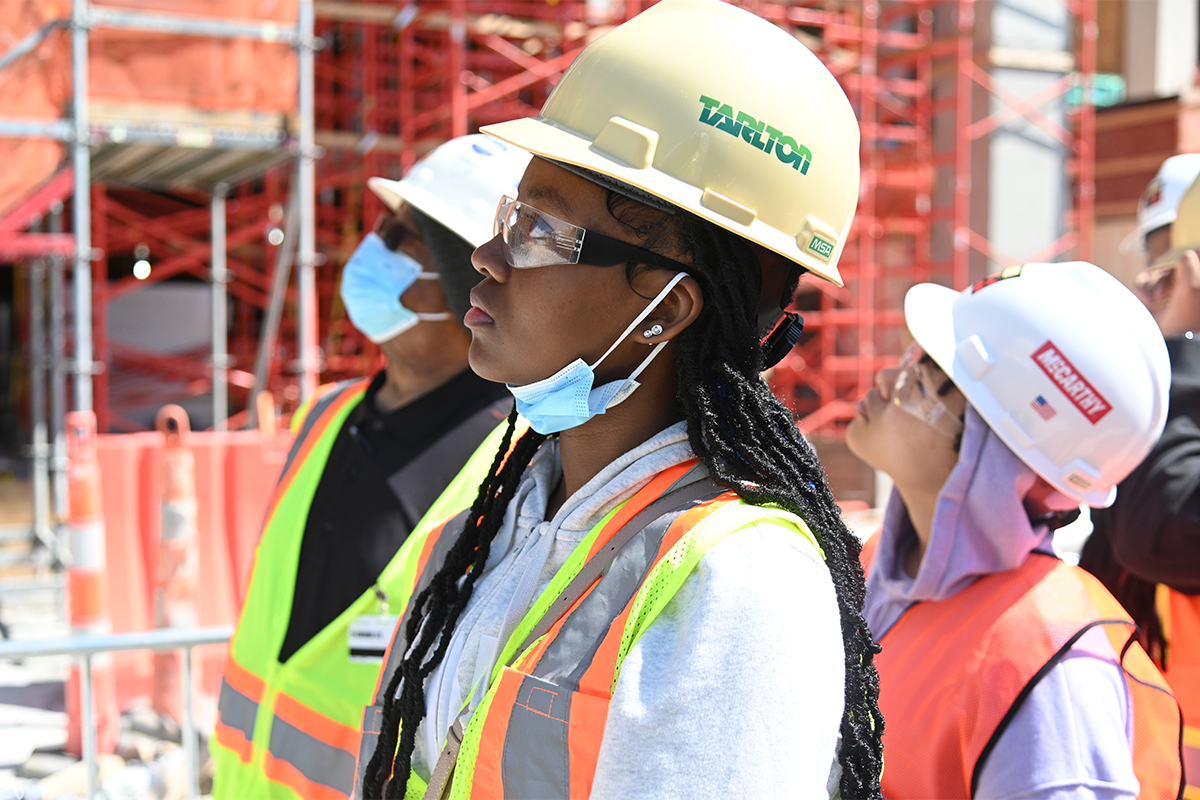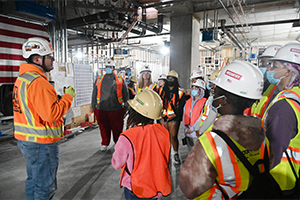
McCarthy Building Companies’ site supervisor explains the collaborative effort that it takes to construct the patient care tower.
More than 100 trades men and women worked in choreographed effort inside the 16-story patient care tower under construction at Barnes-Jewish Hospital. Jacobi Reed, a freshman at Kairos Academies, watched with amazement.
He and 12 classmates took in the sounds of pounding and drilling as the project superintendent talked above the noise and described a work day and how crews come together each morning like family.
“Construction could be cool,” Jacobi said later. “This is a place that I’d like to work.”
Jacobi is part of Next Prep, a four-year college and career preparation initiative at Kairos Academies High School that is exposing 80 students to career paths while also teaching high-level professional skills. Next year it will expand to serve 260 students.
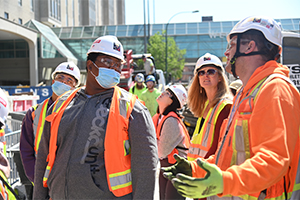
McCarthy site supervisor talks with student Jay Hilbert about the model structures that the construction team creates to test the engineering and design.
The initiative is part of The Opportunity Trust’s strategy to expand high school options so that students across St. Louis are better prepared for post-graduation. While college acceptance nationwide is on the rise, completion is on the decline, leaving millions of high school graduates with thousands of dollars in debt and no degree.
This is the impetus behind BELIEVE STL Academy. In Fall 2024, it is scheduled to open as the region’s first early college high school, with support from The Opportunity Trust. BELIEVE is a public college and career preparatory high school in Indianapolis that puts students on a direct college path, as well as helps them train for an immediate career in a high-paying field. Kimberly Neal-Brannum, founder and executive director, is a St. Louis native who is returning home to replicate the school.
“College is the number one way to close the income gap in our country but we also recognize there are lots of other options and opportunities for young adults to earn a livable wage and move into a wealth-building wage,” Kimberly said. “My goal with BELIEVE is to close the income gap. We hope by age 25, all of our grads are working in a high-wage field.”
College completion rates are declining
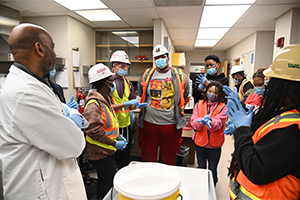
Students visit the pathology lab at Barnes-Jewish Hospital to learn about different diseases and their effects on tissue and organs.
Nationwide, college completion is falling. While overall college-going rates have increased, only 51% of students who began a four-year degree in 2012 completed it within eight years at that institution, according to an April report by Bellwether, a nonprofit that aims to ensure systemically marginalized youth achieve fulfilling lives. Only 30% of students who began a two-year degree in 2012 completed it within eight years at that institution (an additional 29% transferred out), the report states.
“Post-secondary outcomes for students in St. Louis City are even worse,” said Riley Foster, Next Prep program director. “Around one in 10 high school graduates in the city will get a two- or four-year degree six years after high school graduation. And then that leaves this big void of nine in 10 students who are not getting a college degree, and many of whom do go to college and end up with debt but who don’t have any form of degree.” Riley was citing data from the Missouri Students’ Postsecondary Success Report by the PRiME Center at Saint Louis University.
Both Next Prep and BELIEVE address this problem by allowing students to earn industry certifications, an associate degree, or up to two years of college credit tuition-free while also earning their high school diploma. At BELIEVE Circle City, the flagship school in Indianapolis, 15% of the founding class will earn an associate degree before their senior year. Three students have graduated as juniors, in spite of starting high school during the height of the pandemic.
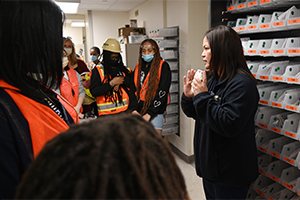
Students visit the telemetry offices at Barnes-Jewish Hospital where the hospital monitors and communicates about patients’ heart functions.
In St. Louis, BELIEVE is forging partnerships with area colleges and universities to reduce barriers to college access, and plans to open as a charter school.
Both BELIEVE and Next Prep aim to help students plug into careers that are high-paying and booming in the St. Louis area, such as tech and health care. A growing network of employers have signed on as partners or advisors for Next Prep, including BJC Healthcare, Edward Jones, Barry-Wehmiller, Missouri Botanical Garden, and more than 20 others.
At Kairos, Next Prep was optional for freshmen this year. Demand was so high that it will be available to all freshmen and sophomores this fall.
It’s allowed Shaniya Harris, a freshman, to figure out that she’s interested in pursuing health care as a career. She and her classmates have been investigating their strengths, purpose, talents, and long-term goals, as well as exploring over 20 different career pathways within five primary career clusters. After meeting health care professionals through Next Prep field trips and panel discussions, Sheniya wants to go into pediatrics.
As a sophomore, she’ll develop high-level professional skills while researching two to three health science careers of significant interest. Juniors and seniors who complete the first and second years will be eligible to continue into a customized version of the program that will include industry-recognized certifications, dual enrollment, internships, and more.
“I’m looking forward to learning more about my career field – medicine and healthcare,” Shaniya said. “When I go to college I’ll have focus and be more prepared for it.”
